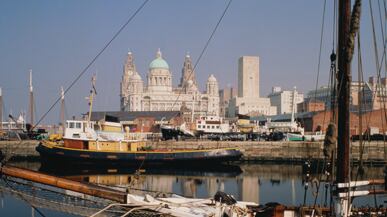The legendary travel writer Jan Morris writes that the farewell foghorns of Liverpool Port sing a song of battered dignity. Her latest book is Contact!.
Architecture is frozen music, Goethe wrote, and to my mind cities are, too. Some sound concrete clarion calls, some are like string quartets, some trumpet brazen marches, and some squeal in sheer discord. The city of Liverpool, on the west coast of England, always suggests to me some heroic old warhorse of an opera.

Delicate melodies do not represent this tough industrial seaport. Drumrolls do. And tragic arias, and terrific choruses, together with poignant curtain calls and a bafflingly complex libretto, the whole underscored by clashes of earthy humor. Even the peculiarly adenoidal dialect of the place, nicknamed Scouse, somehow sounds subversive and funny at the same time, as operas often can.
The first theme in this heady opus is a song of the sea. Liverpool was no more than a pretty village at the mouth of the River Mersey until—during the years of the British climax—it became one of the great ports of the world, Europe’s prime port of entry to the United States. Foreigners of many kinds, Irish to Scandinavian to Chinese, settled in Liverpool, and the maritime wealth of the place showed itself in some splendid civic buildings and institutions: museums, art galleries, a distinguished university, and a symphony orchestra. To this day the prime image of Liverpool is still the clump of hefty Edwardian buildings, nicknamed in the ironic Scouse way, the “Three Graces.” They dominate the waterfront, and almost everywhere else in the city center the influence of the sea is apparent too.
Here, in the heyday of steam, the great liners came and went. Here, in times of war, vast convoys set sail for America. And here, in a bunker behind the Three Graces, the Battle of the Atlantic was conducted. Memories of ships and seamen, of monumental shipping companies, of shipwrecks and bombings and record Atlantic crossings—all this flotsam of maritime memory floats around the streets of Liverpool still.
[T]he Beatles, have left a stamp upon the place to rival Verdi or Puccini—pilgrims from around the world swarm to the site of the Cavern Club where their careers began.
But it is mostly memory now, which adds a strain of pathos to the civic composition. Nowadays few big ships tie up below the Three Graces, and soon nobody will remember the mighty tall-funneled passenger ships lying there so portentously, the sliver of steam from their stacks, the grand bellow of their farewell foghorns. The shipping offices are shipping offices no longer. The old quays and warehouses have become museums or tourist attractions. And except for ships passing by on their way to newer docks upstream, the chief movement on the waters is the passage of the Mersey ferries over the river to Birkenhead.

Ah, but hark! There’s an aria for that—“Ferry Cross the Mersey.” Remember the old hit by Gerry and the Pacemakers? In our lifetimes Liverpool has suffered violent ups and downs of fortune: cruel bombings in World War II, miserable economic recessions, frenzied demolitions, and plans of reconstruction that repeatedly came to nothing. Through it all, though, the cosmopolitan Scouseness of the people survived: as a famous Liverpudlian catchphrase had it long ago, “It’s being so cheerful as keeps us going.” Liverpool FC remained a passionately beloved football club, and generations of local lyricists, comedians, and song-and-dance men sustained the city’s high-spirited reputation at home and abroad. The most famous of them all, the Beatles, have left a stamp upon the place to rival Verdi or Puccini—pilgrims from around the world swarm to the site of the Cavern Club where their careers began, and far more sightseers stand in awe before the bronze sculpture of the Fab Four in the Cavern Walks Shopping Centre than mourn the seamen remembered in the Merchant Navy War Memorial, down at the Pier Head…
So the incorrigible old city staggers on through history. The handsome civic constructions of its prime still give it a battered kind of dignity. Today at last those half-cocked plans of revival have resulted in some worthy 21st-century developments. And as always the opera that is Liverpool expresses a grand mélange of emotions—pride and regret, nostalgia and cynicism, hope and disillusionment, comedy, anger, and forbearance. In 2008 it was proclaimed the annual European Capital of Culture, but it might better be dubbed one of the permanent and universal Capitals of Life!
Plus: Check out Book Beast for more news on hot titles and authors and excerpts from the latest books.
Jan Morris, who has been writing about the world for fifty years, is the author of Conundrum , Venice , and, most recently, Contact!, among many other books. She lives in Wales.






